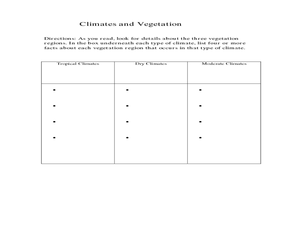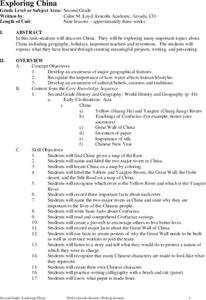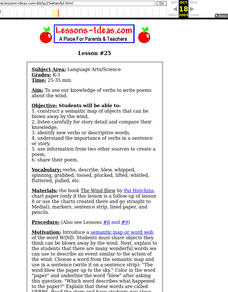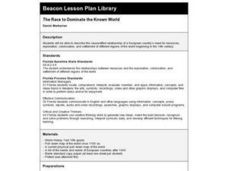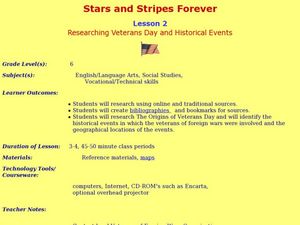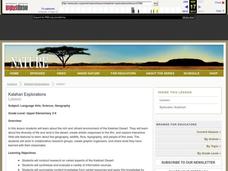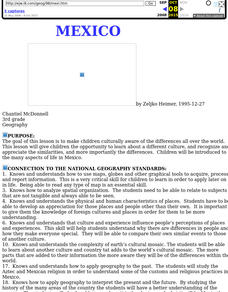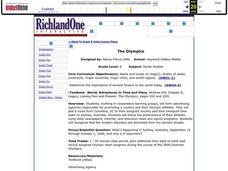Curated OER
What I Did On My Summer Vacation
Students use the internet to research the location of their summer vacation trip. Given the demographics, they plot the location on a world map. They create a brochure using the information they collected. Using PowerPoint, they develop...
Curated OER
Canada's Natural Regions and Their Varied Characteristics
High schoolers examine Canada's six natural regions, with all their underlying human and economic activities, identify specific characteristics of each region, discover economic and human riches of natural regions and, create...
Curated OER
Physical Geography- Climate
Sixth graders explore different climates. For this compare and contrast lesson, 6th graders look at the differences in climates of America and Europe. Students use KWL charts and graphic organizers to record information about different...
Curated OER
Exploring Switzerland
Second graders research the country of Switzerland using the Internet and other resource materials. A variety of excellent materials are provided.
Curated OER
Arkansas History Lesson: Arkansans
Third graders investigate famous Arkansans and their contributions. In this Arkansas history lesson, 3rd graders are divided into small groups and use a variety of resources to research one important Arkansan. Students write a biography...
Curated OER
Comparing Family Photos
Fourth graders bring in a family photo from home. They compare their photo to the Rawding family photo. Students share their conclusions orally. They use Venn Diagrams to organize their thoughts and observations.
Curated OER
Exploring China
Second graders explore the geography, holidays, important teachers, and inventions from China in the nine lessons of this unit. The results of their inquiries are expressed through a variety of products, writings, and presentations.
Curated OER
Watershed Tourist
Young scholars recognize and categorize different bodies of water. In this watershed and water environments instructional activity, students "Follow the Water from Brook to Ocean." Young scholars define the different bodies of water and...
Curated OER
Telling Time in Different Time Zone
Fourth graders create clocks and complete small group activities to represent the six different times zones in the US. Using small paper plate clocks, 4th graders visually demonstrate the differences in these time zones.
Curated OER
Sticks, Stones, Sinews and Stuff: How Early People Used the Environment to Meet Basic Needs
Students create an artifact. For this early survival lesson, students use found objects to create an artifact that could have been used to help early people meet their basic needs.
Curated OER
The Race to Dominate the Known World
Students describe cause/effect relationship of a European country's need for resources, exploration, colonization, and settlement of different regions of the world beginning in the 14th Century, and role play representatives of assigned...
Curated OER
Using Vegetation, Precipitation, and Surface Temperature to Study Climate Zones
Middle schoolers begin their examination of the climate zones found around the world. Using a software program, they identify the relationship between the vegetation, climate and temperatures of the different zones. They also plot...
Curated OER
It’s a Big, Big World
Students examine the role of the explorers. In this explorers and conquistadors, students create word puzzles (Wordles) regarding the time period in history. Students conduct research regarding a particular explorer and create foldables...
Curated OER
Painted Dreams
Third graders explore the importance of art in Haitian culture by analyzing the cause and effect within the story, "Allie's Basketball Dream." They examine all the aspects of the story and characters including their goals, dreams,...
Curated OER
Stars and Stripes Forever: Researching Veteran's Day and Historical Events
Sixth graders research Veteran's Day and wars that affected the United States. In this research lesson, 6th graders work in small groups to create an oral presentation based on Internet and conventional research. They complete...
Curated OER
International Festival: Greece
Learners celebrate the culture of Greece. In this multicultural activity, students participate in several activities which examine the culture of Greece. Learners study the Greek alphabet, identify the country on a world map, and make...
Curated OER
Kalahari Explorations
Learners explore world geography by completing graphic organizers and researching the Internet. In this Kalahari desert lesson, students identify the geographic location, weather and creation of the Kalahari desert. Learners define a...
Curated OER
Filling in the Picture
Young scholars study archaeological sites. They discover some of the problems inherent in choosing sites and what parts are chosen for excavation. They evaluate and explain their choices for study and articulate the process of...
Curated OER
Mexico
Third graders become culturally aware of the differences all over the world. They explore a different culture, and recognize and appreciate the similarities and differences with their own.
Curated OER
Slaves, the Labor Force, and the Economy
Students examine critical role that slaves, freemen, and plebeians played in the Roman Empire. They complete creative writing that addresses how the Roman class system and the use of slavery contributed to the downfall of the Roman Empire.
Curated OER
The Olympics
Students will research the geography and designa route form Columbia SC to an olympic competition, then follow local news and current events to track team perfomance.
Curated OER
America Enters WWII
Students analyze the attack on Pearl Harbor. In this World History lesson, students research the events that led to the attack of Pearl Harbor then discuss the what happened after the attack. They finish the lesson with writing a...
Curated OER
Why Do You Live Where You Do?
Eighth graders identify reasons why settlers bought land from the railroad and not a Homestead grant. Using that information, they compare and contrast the types of land given in each situation. They discuss the reasons why given...




